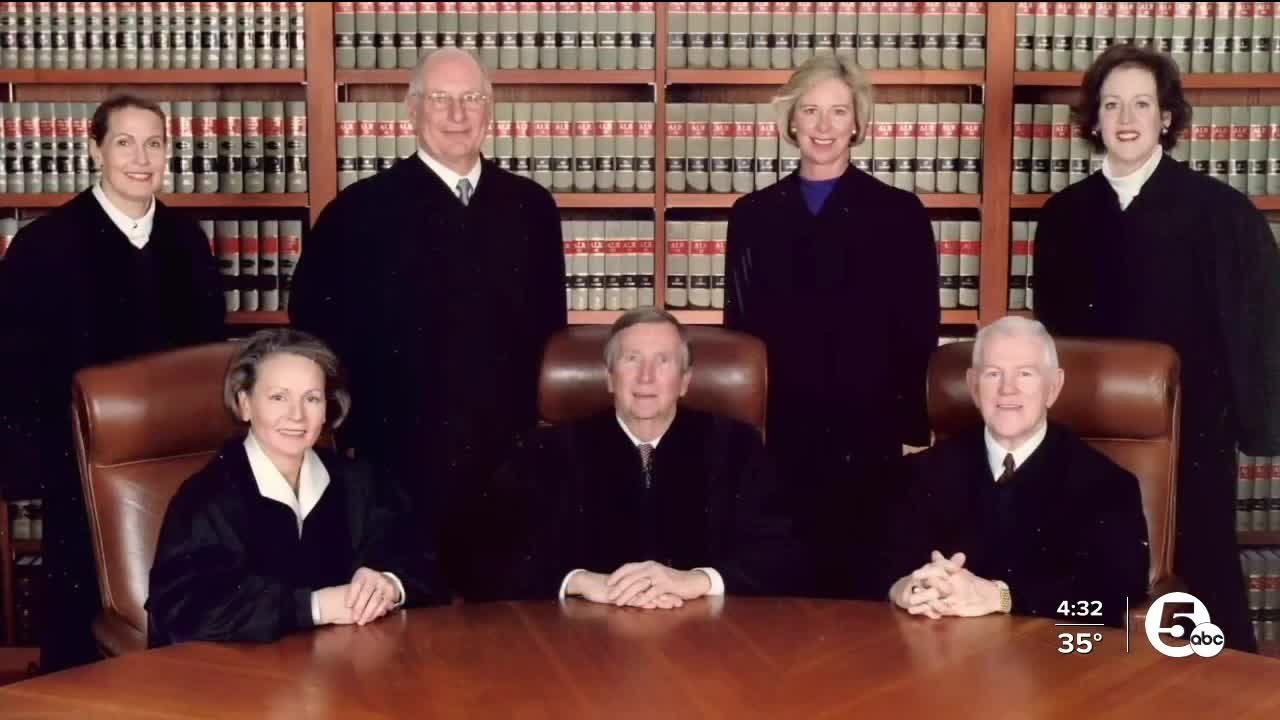COLUMBUS, Ohio — Ohio Supreme Court Chief Justice Maureen O'Connor's four-decade-long career in public office is coming to a close, but that doesn't mean the longest-serving statewide elected woman in state history is slowing down.
The Republican's accomplished career began after graduating from the Cleveland-Marshall School of Law, recently renamed Cleveland State University College of Law. She spent years in Summit County, first working as a lawyer, then as a judge for both the probate and common pleas courts.
In what she called a time of need, she stepped down from the bench to take the job of county prosecutor. She was then elected lieutenant governor before joining the Ohio Supreme Court (OSC) as an associate justice in 2003. She became the first woman in state history to lead the high court when she was elected as chief justice in 2010.
In her tenure, she focused on modernizing the criminal justice system by fighting for bail reform, creating addiction treatment programs and working to standardize criminal sentencing across Ohio.
In recent years, she acted as an independent voice on a divided Ohio Supreme Court.
“You don’t take your politics, you don’t take your religion, you don’t take a lot of things into consideration,” O'Connor said in an interview with News 5 Cleveland and partner Ohio Capital Journal. "They don’t color how you do your job and if they do… you don’t deserve to wear the robe.”
That independent spirit has never been more evident than it was in 2022.
"It would have been so easy to do the right thing," she said.
Redistricting
O’Connor ruled seven separate times that GOP-backed redistricting maps were unconstitutional and gerrymandered — earning scorn and resistance from the party that once championed her.
Some lawmakers in the Republican party called her a traitor and others called for her impeachment, with Sec. of State Frank LaRose saying he wouldn't "mind" if she was.
"That was all political drama," she laughed. "Those are partisan statewide officeholders and they have a base that they have to appeal to."
But she was more than fair to the Ohio Redistricting Commission (ORC), she said.
"We gave various other directives like... hire an independent mapmaker, do it in public," she said. "And all along there was... absolute resistance.
"The constitutional makeup of the redistricting commission, I think, was at the heart of the problem, quite frankly."
So then why wouldn't O'Connor hold the ORC in contempt, which she had threatened?
"It could very well lead to what I would consider a constitutional crisis and I did not want that muddying the waters," the chief justice said. "I did not want them to, in some way, portray the victim."
She also wouldn't have been able to just hold specific lawmakers in contempt, but the entire commission (including the two Democrats). This would not have done any good, O'Connor argued.
"It would be more harmful to the image of the institutions of the state and I think there was enough harm being done," she said.
Angry with the chief, Republicans brought the case to federal judges, asking for them to deal with the ORC's denials of the maps. Those judges gave the ORC a timeline: create a new map or the third map will be implemented.
“My thought on it was: If you hadn’t given them the wink and nod that the third map was going to be used; where’s the incentive for them to have done something by the end of May with a constitutional map?” O’Connor said. “Absolutely none.”

What's next
The state’s age restriction meant she couldn’t run for another term, so now she is exchanging her spot on the bench for a spot in the political field.
She will be working towards a constitutional amendment to create an independent commission, one where politicians won’t get to draw maps that benefit themselves.
"People who put party and politics before [justice], I think it's unfortunate," she added. "I think it's unfortunate for them, and I don't see the world that way, and never will."
But the trickery didn't stop when the federal court intervened in the redistricting case.
Ohio Republicans introduced a resolution in November to purposely make it more difficult to amend the state Constitution. House Joint Resolution 6 would require all constitutional petitions to receive a 60% supermajority vote to pass instead of the simple 50%+1 — letting the 40%+1 of the population choose Ohio laws.
This received immense backlash, with hundreds of progressive, conservative and nonpartisan Ohioans protesting at the Statehouse. The timing of it was suspicious for all groups — like the ACLU who said it clearly targeted redistricting reform and abortion measures.
The obviously unpopular resolution was struggling, with House Speaker Bob Cupp (R-Lima) saying he didn't see it moving forward.
In a last-ditch effort, bill sponsor state Rep. Brian Stewart (R-Ashville) sent out an email, explaining how it actually was about redistricting reform and abortion and how the GOP lawmakers need to know that so they can vote for it. This backfired grandly when it was leaked, considering he originally told News 5 that he couldn't control any "conspiracy theories" about the timing of the resolution.
O'Connor had predicted this, she said, noting that there was a huge outcry to combat gerrymandering in the years leading up to 2018. Once the voters overwhelmingly chose a new system, one that was supposed to prevent supermajority power from dictating maps, they realized that this system could still be exploited.
The GOP "mischaracterized what [redistricting reform] really was and how it would be administered," she said.
"I don't think the public would have bought it if that would have been understood."
Final thoughts
When looking back on her career, she smiled.
"I have no regrets."
To read a longer version by news partner OCJ, click or tap here. For O'Connor's career through the years, click or tap here.
Follow WEWS statehouse reporter Morgan Trau on Twitter and Facebook.





